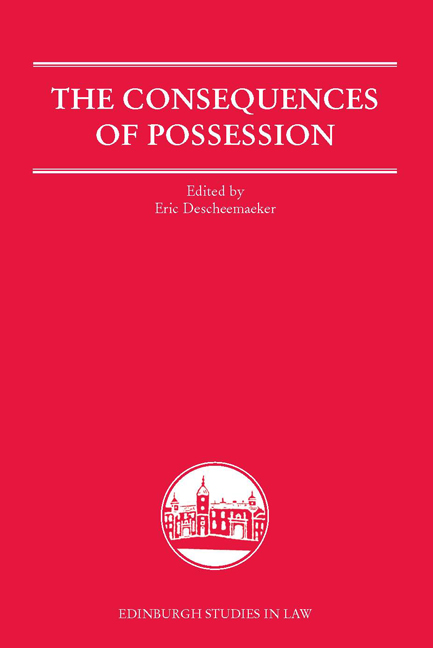Book contents
- Frontmatter
- Contents
- Foreword
- List of Contributors
- Table of Cases
- Table of Statutory Materials
- 1 The Consequences of Possession
- 2 Why Protect Possession?
- 3 Is Possession Factual or Legal?
- 4 Possession as a Source of Property at Common Law
- 5 The Evolution of Possessory Actions in France and Italy
- 6 The Protection of Possession in Scots Law
- 7 Possessio civilissima in Spanish and German Law: Protecting Possession between Fact and Fiction
- 8 Possession of Incorporeals
- 9 The Protection of Quasi-Possession in South African Law
- Index
1 - The Consequences of Possession
Published online by Cambridge University Press: 07 December 2017
- Frontmatter
- Contents
- Foreword
- List of Contributors
- Table of Cases
- Table of Statutory Materials
- 1 The Consequences of Possession
- 2 Why Protect Possession?
- 3 Is Possession Factual or Legal?
- 4 Possession as a Source of Property at Common Law
- 5 The Evolution of Possessory Actions in France and Italy
- 6 The Protection of Possession in Scots Law
- 7 Possessio civilissima in Spanish and German Law: Protecting Possession between Fact and Fiction
- 8 Possession of Incorporeals
- 9 The Protection of Quasi-Possession in South African Law
- Index
Summary
Labeo, at the turn of the Christian era, tells us that he who “sits” over a thing (res) possesses it. Subject to a difficulty about what sort of entities can be possessed, the metaphor could hardly be clearer: possession speaks of factual control, with its unavoidable corollary, the power to exclude others. In that sense, possession does not have to be invented by lawyers: it pre-exists any form of apprehension of reality by the interpretative and creative power of the law. This is probably the reason, or at least part of the reason, why it is routinely described as a raw “fact”: while this assertion needs to be severely nuanced, precisely because the intervention of the law is bound to bring in a degree of artificiality, it has to be our starting point both historically and conceptually: possession describes a relationship of factual control of a person over a thing.
From a civilian perspective at least (but this is language that can also be understood by common lawyers, and might in fact belong to the shared, pre-legal intuitions of mankind), possession will invariably be contrasted with ownership: whether there is any underlying analytical necessity or not, any reader will know from experience that no analysis of either concept is allowed to continue for long without the other being brought in as part of an exercise in contrast and differentiation. The dichotomy seems indeed simple and intuitively graspable by any layman: on the one hand, the possessor says, “I have it”; on the other, the owner claims, “it is mine” The neatness of the distinction provides us with an anchor that the artificiality of the law can never completely undo.
Yet difficulties are bound to crop up almost immediately. Sooner or later, “it is mine” will want to translate into either “I have it” or “I want to have it”: by asserting ownership, the rei vindicatio seeks possession.
- Type
- Chapter
- Information
- The Consequences of Possession , pp. 1 - 29Publisher: Edinburgh University PressPrint publication year: 2014



